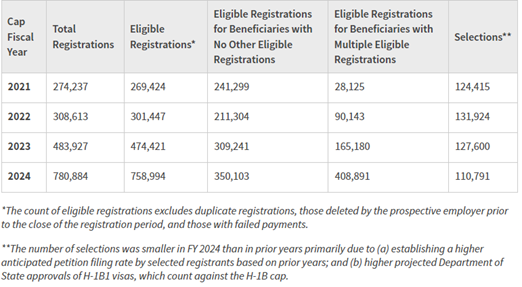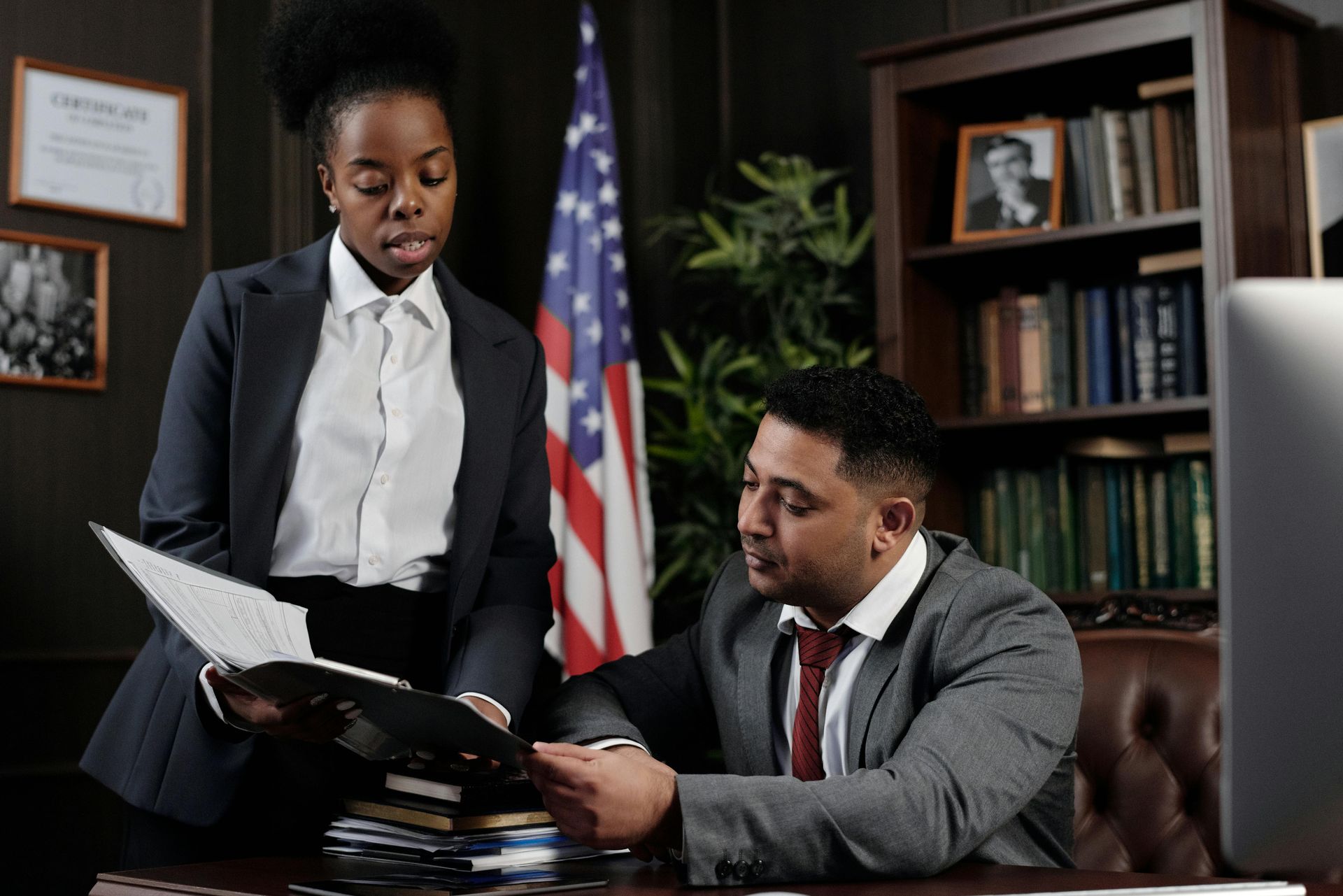L'USCIS enquête sur des fraudes à l'enregistrement des visas H-1B pour l’année 2024
Kris Quadros-Ragar • November 16, 2023
Click here to read this article in English
Les services de citoyenneté et d'immigration des États-Unis (USCIS) ont récemment publié un avis exprimant des inquiétudes quant à une éventuelle fraude dans le processus d'enregistrement des visas H-1B au cours de l'année fiscale 2024.
Le 27 mars 2023, l'USCIS a annoncé avoir atteint la limite annuelle pour les enregistrements H-1B de l'année fiscale 2024, ayant reçu 780 884 enregistrements électroniques, une augmentation significative par rapport aux 483 927 enregistrements de l'année précédente, qui avaient également connu une augmentation considérable par rapport à l'année d'avant.

Selon l'USCIS, outre l'augmentation du nombre d'enregistrements, l'agence a constaté une augmentation notable du nombre d'enregistrements soumis pour des bénéficiaires ayant plusieurs enregistrements éligibles, ce qui pourrait impliquer un effort de la part d'individus ou d'entreprises pour obtenir un avantage au cours du processus de sélection. L'agence a identifié des entreprises spécifiques comme étant responsables de numéros potentiellement illégitimes, y compris près de 100 000 déclarants qui ont soumis des pétitions multiples au nom du même bénéficiaire, totalisant plus de 400 000 enregistrements potentiellement frauduleux - près de la moitié des numéros de l'année fiscale 2024.
L'USCIS enquête actuellement sur cette affaire et prendra les mesures appropriées contre toute activité frauduleuse, y compris le renvoi des individus ou des entités aux autorités fédérales chargées de l'application de la loi en vue d'éventuelles poursuites pénales. Le communiqué de l'agence a également confirmé que l'USCIS a l'intention de disqualifier les personnes inscrites, y compris celles qui ont déjà été sélectionnées, si elles se sont livrées à des fraudes pour augmenter leurs chances d'être sélectionnées, et de refuser les demandes ou de révoquer les approbations si elle trouve des preuves de fausse attestation ou de fraude.
En outre, pour renforcer le processus d'enregistrement H-1B et décourager les activités frauduleuses à l'avenir, l'USCIS a proposé une nouvelle règle de modernisation H-1B. Dans le cadre de cette proposition, l'agence prévoit d'augmenter les frais d'enregistrement du quota H-1B de 10,00 $ actuellement à 215,00 $. Cette mesure vise à décourager les doubles demandes et à empêcher l'utilisation abusive du système d'enregistrement H-1B. En augmentant les frais d'enregistrement, l'USCIS espère décourager les activités frauduleuses et rationaliser le processus afin de s'assurer que seuls les candidats éligibles déposent une demande pour le quota H-1B. Si la proposition est acceptée, la nouvelle taxe devrait entrer en vigueur pour la loterie de l'année prochaine.
Si vous pensez pouvoir prétendre à un visa H-1B, nous vous invitons à prendre contact avec notre cabinet pour une consultation.
Ce blog n'est pas destiné à fournir des conseils juridiques et rien ici ne doit être interprété comme établissant une relation avocat-client. Veuillez prendre rendez-vous avec un avocat spécialisé en droit de l'immigration avant d'agir sur la base de toute information lue ici.
This Facebook widget is no longer supported.
Kris Quadros-Ragar
Similar Posts

U.S. Citizenship and Immigration Services (USCIS) has announced a major change to the H-1B cap selection process. Under a final rule issued on December 29, 2025, USCIS will replace the long-standing random H-1B lottery with a wage-weighted selection system that favors higher-paid and more complex positions. The rule is scheduled to take effect on February 27, 2026 , just ahead of the fiscal year 2027 H-1B cap registration season, unless delayed by legal challenges. If implemented, USCIS is expected to release additional guidance explaining how employers must submit registrations under the revised process. This change marks one of the most significant reforms to the H-1B program in recent years. Up until 2025, all registrations were treated equally once the annual cap was reached. Under the new system, selection odds will be tied to wage levels based on the U.S. Department of Labor’s Occupational Employment and Wage Statistics data. All H-1B registrations will still be placed into a single selection pool, but registrations tied to higher wage levels will receive multiple entries into that pool, increasing their likelihood of selection. Lower wage levels will receive fewer entries, making selection less likely but not impossible. H-1B wage levels are not determined solely by salary. Each wage level reflects the complexity of the job, the level of responsibility involved, and the education and experience required . Entry-level positions involving routine duties and close supervision are generally classified at the lowest wage level, while positions requiring independent judgment, advanced skills, and significant responsibility fall into higher wage levels. The highest wage level is reserved for roles that involve expert knowledge, strategic decision-making, and substantial leadership or technical authority. USCIS is expected to closely scrutinize selected petitions to ensure that the wage level claimed during registration is supported by the job duties and salary offered in the petition. Any discrepancies between the registration and the petition may result in requests for evidence, denials, or enforcement action. With the elimination of the purely random lottery, employers should begin preparing early by carefully evaluating job descriptions, wage levels, and overall H-1B strategy. Accurate classification and thoughtful planning will be essential under this new wage-based selection system. If you are an employer considering H-1B sponsorship, or a foreign professional wondering whether your position may qualify under the new wage-based system, consulting with experienced immigration counsel is more important than ever. Santos Lloyd Law is actively advising clients on H-1B cap registrations and strategy under the new rules. To discuss your options or determine whether you may qualify, contact our office to schedule a consultation.

A key development occurred in December 2024, when the deference policy was officially written into regulation (the “H-1B modernization rule”), set to take effect on January 17, 2025. Once it takes effect, USCIS adjudicators must apply the deference policy to extension requests involving the same employer, the same employee, and the same job details. USCIS can still decide not to defer to the previous approval if: There was a material error in the earlier approval. There has been a material change in circumstances or eligibility. New information raises doubts about eligibility. Even in these situations, officers must explain why they are not deferring. Importantly, USCIS does not have to defer to decisions made by other agencies, such as the U.S. Department of State or Customs and Border Protection. By turning the deference policy into a regulation, it becomes more difficult for future administrations to eliminate it quickly. Any attempt to rescind or change the policy now requires a lengthy rulemaking process that includes a public notice-and-comment period. Key Takeaways for Employers Greater Predictability: The deference policy, now a regulation, gives employers more certainty that extension petitions will be approved if there are no major changes in the employee’s role or the employer’s situation. Potential Changes Ahead: A future administration could still try to rescind this rule, but they must follow a formal regulatory process, which takes time and offers employers some warning. File Extensions Early: Employers can submit extension petitions up to six months before a visa expires. Filing early can help avoid unexpected policy shifts and minimize risks of RFEs or denials. Overall, the codification of the deference policy is a significant step that offers much-needed stability and efficiency in the U.S. immigration process. By planning ahead and staying informed, employers can take advantage of this improved predictability. As always, working closely with an immigration attorney ensures that extension applications are accurate, well-prepared, and filed promptly—especially during times when policy may evolve.

The U.S. Citizenship and Immigration Services (USCIS) has recently announced a significant enhancement to its customer experience with the upcoming launch of organizational accounts for H-1B cap season. These measures, set to debut in February 2024 , aim to boost efficiency and foster collaboration among organizations, legal representatives, and USCIS. One of the key features of this improvement is the introduction of organizational accounts for non-cap filings and the fiscal year (FY) 2025 H-1B cap season. This innovation allows multiple individuals within an organization and their legal representatives to collaborate seamlessly on H-1B registrations, Form I-129 (Petition for a Nonimmigrant Worker), and associated Form I-907 (Request for Premium Processing Service). The introduction of organizational accounts marks a transition to a fully electronic H-1B lifecycle, covering registration, petition preparation, decision-making, and transmission to the Department of State. USCIS expects to launch organizational accounts in February 2024, with the online filing of Forms I-129 and I-907 following shortly thereafter. This shift to electronic filing is anticipated to streamline the H-1B petition process, reducing common errors and eliminating duplicate H-1B registrations. Further, as part of USCIS's broader efforts to enhance efficiency and standardize processes, the paper filing location for Forms I-129 and I-907 will transition from service centers to the USCIS lockbox. This move aims to reduce costs while maintaining a more streamlined and standardized approach to handling H-1B petitions. With these customer experience improvements, USCIS is taking a significant stride towards modernizing and streamlining the H-1B petition process. As we approach the FY 2025 H-1B registration period, Santos Lloyd Law Firm is closely monitoring the evolving landscape of H-1B changes and actively engaging in upcoming sessions to maximize the benefits of these improvements.

In a recent update, the U.S. Citizenship and Immigration Services (USCIS) confirmed that the immigration agency has received a sufficient number of petitions, meeting the congressionally mandated caps for H-1B visas for fiscal year (FY) 2024. Both the regular cap of 65,000 and the U.S. advanced degree exemption, also known as the master’s cap, of 20,000 have been reached. Non-selection notices will be sent to registrants through their online accounts over the next few weeks. For those exempt from the cap, USCIS will continue to accept and process petitions. This includes petitions filed for current H-1B workers who have been previously counted against the cap and still retain their cap number. Fiscal Year (FY) 2025 Lottery Registration for the H-1B cap lottery for FY 2025 is expected to open in March 2024. The increase in submissions from previous years, especially for workers with multiple registrations, has prompted the agency to express concerns about attempts to manipulate the selection process. If the proposed changes released by USCIS on October 23, 2023, are implemented, there is an anticipation of a more streamlined H-1B process, where registrants will be selected as individuals and not based on the number of registrations. Meanwhile, USCIS has initiated fraud investigations into alleged efforts to manipulate the lottery, which could result in the denial of petitions or referrals to law enforcement. The agency is still accepting petitions for visas exempt from the H-1B cap, such as those for jobs at colleges and universities or research institutions. Santos Lloyd Law Firm will continue to monitor developments and publish updates related to the Fiscal Year 2025 H-1B lottery as they become available. Font: https://www.uscis.gov/newsroom/alerts/uscis-reaches-fiscal-year-2024-h-1b-cap

U.S. Citizenship and Immigration Services (USCIS) has announced a major change to the H-1B cap selection process. Under a final rule issued on December 29, 2025, USCIS will replace the long-standing random H-1B lottery with a wage-weighted selection system that favors higher-paid and more complex positions. The rule is scheduled to take effect on February 27, 2026 , just ahead of the fiscal year 2027 H-1B cap registration season, unless delayed by legal challenges. If implemented, USCIS is expected to release additional guidance explaining how employers must submit registrations under the revised process. This change marks one of the most significant reforms to the H-1B program in recent years. Up until 2025, all registrations were treated equally once the annual cap was reached. Under the new system, selection odds will be tied to wage levels based on the U.S. Department of Labor’s Occupational Employment and Wage Statistics data. All H-1B registrations will still be placed into a single selection pool, but registrations tied to higher wage levels will receive multiple entries into that pool, increasing their likelihood of selection. Lower wage levels will receive fewer entries, making selection less likely but not impossible. H-1B wage levels are not determined solely by salary. Each wage level reflects the complexity of the job, the level of responsibility involved, and the education and experience required . Entry-level positions involving routine duties and close supervision are generally classified at the lowest wage level, while positions requiring independent judgment, advanced skills, and significant responsibility fall into higher wage levels. The highest wage level is reserved for roles that involve expert knowledge, strategic decision-making, and substantial leadership or technical authority. USCIS is expected to closely scrutinize selected petitions to ensure that the wage level claimed during registration is supported by the job duties and salary offered in the petition. Any discrepancies between the registration and the petition may result in requests for evidence, denials, or enforcement action. With the elimination of the purely random lottery, employers should begin preparing early by carefully evaluating job descriptions, wage levels, and overall H-1B strategy. Accurate classification and thoughtful planning will be essential under this new wage-based selection system. If you are an employer considering H-1B sponsorship, or a foreign professional wondering whether your position may qualify under the new wage-based system, consulting with experienced immigration counsel is more important than ever. Santos Lloyd Law is actively advising clients on H-1B cap registrations and strategy under the new rules. To discuss your options or determine whether you may qualify, contact our office to schedule a consultation.

During the recent administration there has been an increase in issuance of Requests for Evidence for EB-1A petitions for those of Extraordinary Ability. A Request for Evidence is a request that is made by USCIS that should explain how the evidence is deficient in proving the criteria argued and what additional evidence needs to be provided by the applicant to meet the criteria. EB-1A petitions are already normally subject to higher scrutiny because their approval is the first step needed to apply for Lawful Permanent Residence or a green card. USCIS normally requires not just evidence but that the evidence be provided with context and information to show why it matters in a particular field. For example, if you were providing evidence of your membership in an organization that requires outstanding achievements of its members, just providing evidence of the membership is not enough. You must explain what that membership is and provide background information on the organization granting the membership. You also need to provide evidence on the criteria that is used to select the members, information on those who select the members to show that they are recognized experts, other documentation such as articles about the membership organization to show its importance, and any other relevant evidence and background information to show that the criteria is met. A request for evidence being issued prior to the current administration was not uncommon, but in the current climate it is more surprising to not receive a request for evidence for this type of case. It is important to remember that a request for evidence is not a denial. Depending on the validity of the information in the request and the substance some Requests for Evidence can be overcome, and the case be approved. It is important to carefully review the request and note if there are any errors in the content and application of the regulations by USCIS. If you have an attorney, you should work with them and make sure that you provide any evidence you think may be helpful. Although there is a deadline by which a response must be submitted, attention to detail and patience will go a long way when dealing with having to respond to a request for evidence. If you believe you may qualify for this type of visa, please feel free to contact our office.



